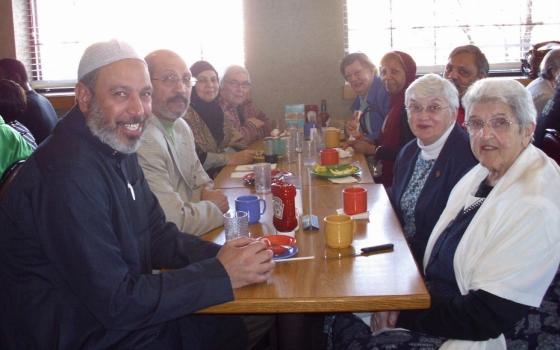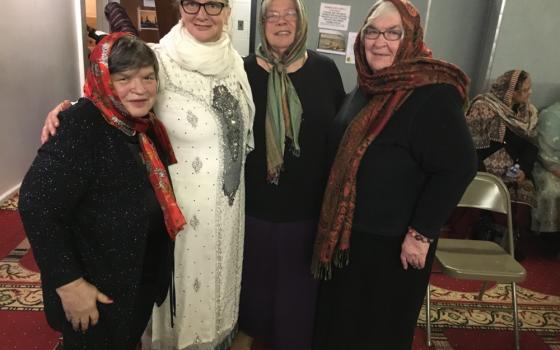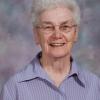In September 2016, the Bridge Initiative of Georgetown University issued a disturbing report on how Catholics perceive the religion of Islam and the people who follow it. The survey indicated that only 14 percent of American Catholics have favorable views of Muslims, 30 percent have unfavorable views, while 45 percent have neither favorable nor unfavorable views. The bright spot for me is that while only 3 in 10 Catholics know a Muslim personally, those who do have a far more positive view of Muslims as a whole. So, the challenge, it seems, is to encourage at least the 45 percent to get to know an individual Muslim or a family.
I am grateful that members of my community, the Sisters of St. Francis of Philadelphia, are among those Catholics who have favorable views of Muslims because we are blessed to have a five- year relationship with a Muslim community, a relationship that has developed into friendship. When the possibility arose to create a relationship with the Zubaida Foundation Mosque in Yardley, Pennsylvania, we welcomed the opportunity. We recalled a treasured story in our Franciscan tradition, that of Francis of Assisi visiting the Sultan of Egypt during the violence of the fifth Crusade, and the mutual respect, even admiration, they showed each other.
In March 2011, a group of our sisters and companions made our first visit to the Zubaida Foundation, and so began a rich relationship. Since that time we have met three times a year alternating between the mosque and our motherhouse, exchanging information and experiences about our beliefs, rituals, cultures and times of celebration. We have shared prayer and meals, as well as each other's practices and activities. We were surprised to learn about the extent of their service on behalf of needy people of all faith traditions or even of no faith tradition.
As our comfort level grew, we were able to ask questions about each other's religion and discuss aspects common to both traditions, such as the importance of pilgrimage and of peacemaking. On one of our early visits, each of us was honored to be presented with a gift of a copy of the Quran. I was surprised to learn how much we have in common. It was enlightening to learn about the place of Mary and the Annunciation in the Quran. My reading confirmed that as important as belief is, belief alone is not enough. I learned that there are five pillars of Islam. Muslims are required to offer daily prayers of gratitude, to give charity and show sympathy with the needs of the poor, to fast during the month of Ramadan, to be God-conscious, to learn perseverance, and to travel to Mecca, if affordable, once in one's lifetime.
We were especially interested in a presentation by two young Muslim women, one in law school and the other a married woman and massage therapist, about their perspectives on women in Islam. Each shared her faith journey and insights into equality of Muslim women and the choice of wearing the hijab, which they see as a real sign of courage in today's world. Although I no longer wear a veil, I do wear a religious symbol, and I tend to agree with them.
At the request of our friends, we shared with them a history of the papacy and a glimpse into the role of the Vatican in the lives of Catholics. They were particularly delighted to learn about the visit of Francis to the Sultan during the fifth crusade and the impact it had on each of these two men of faith. Now we and they are excited about the upcoming docudrama , "The Sultan and the Saint," produced by a Muslim film company with strong Franciscan support.
We were honored to be invited to a wedding of the Imam's daughter and to enjoy dinner with our friends as they celebrate Eid Adha, the most important of Muslim holydays. During this four-day celebration, Muslims with financial means are to share one-third of their meat with their neighbors and the other two-thirds with family and friends. They offered some to us so we could share with others.
During this wild election cycle, my sisters and I have been outraged at the violent rhetoric directed against Muslims. Some politicians and their supporters stir up Islamophobia, even blaming all Muslims for the atrocities committed by ISIS. We know that American Muslims also condemn ISIS for nefarious behaviors and do not consider them true followers of Islam. We have assured our Muslim friends of our support, and made our support public to others verbally, by submitting letters to the editor, and by signing statements initiated by other organizations, both Muslim and non-Muslim. We are displaying on the fence outside our motherhouse two large banners which read: "The Sisters of St. Francis say No to Muslim Bigotry."
I am convinced of the importance of us as Franciscan women, and for all Christians, to create and strengthen bonds of friendship with Muslim neighbors and encourage others to do likewise. The report of The Bridge Initiative underscores the challenge for us as Catholics.
My community is intent on furthering our relationship with the men and women of the Zubaida Foundation. We have learned much about Islam and Muslim life, and they have learned more about Catholic Christians. But more than increased knowledge, we have grown in our realization that Muslims are, indeed, our sisters and brothers.
Jesus gave us the law of love; Francis took a risk to visit the Sultan, the Muslim leader, in his own camp. One Franciscan scholar, Michael Calabria, wrote: "It is written in the Quran that Muslims will find Christians as those nearest to them in friendship." I know, and am grateful, that one community of Muslims finds this to be true with my religious community. I pray that many more Muslims in our country may find it to be true in relationships with an increasing number of Catholic communities.
[Sr. Miriam Eileen Murray is currently chair of the JPIC committee of the Sisters of St. Francis of Philadelphia. She has served as assistant congregational minister, after which she assisted in the congregation's Pastoral Services office, and then volunteered with Ministry of Caring in Wilmington, Delaware. She has been a long-time advocate for justice and peace, and for a number of years organized groups of sisters to attend the annual SOA Watch event at Fort Benning, Georgia. ]



